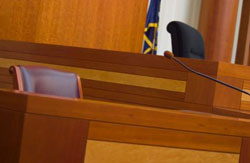What to expect in a Personal Injury Trial:
Most people have seen a television show or movies depicting courtroom dramas or scenes and as a result, they have a general understanding of what they might expect if they’re ever faced with the prospect of going to court. And some people have already had experience in court, whether as witnesses, Plaintiffs, Defendants, or spectators and employees.
Now we’re going to take those general procedures that most have become familiar with and break down the experience a little bit further so you can get a better understanding of what you could expect to see if your personal injury case has to go to trial. You might also want to review our suggestions and reasons why you need a personal injury attorney.
Jury Selection:
In a personal injury trial, the jurors are the ones who are ultimately responsible for deciding what compensation, if any, will be awarded to a Plaintiff making a personal injury claim. Because of their importance, the first step in any trial usually involves the process of selecting the jury. During this stage, the a number of factors are considered by the presiding judge and attorneys from both sides when making decisions to keep or dismiss certain jurors.

Jury Services provides the courts of Hillsborough County with qualified prospective jurors in accordance with Florida Statutes 40.011 and 40.23 and names are drawn by lot and at random by computer from a list of names provided by the Department of Highway Safety and Motor Vehicles – this includes anyone who has a Florida Drivers License.
The opening statements:
During the opening statements, each side of the case is afforded an opportunity to present their claims in relation to the incident or accident and the injury sustained by the Plaintiff. The defense will typically attempt to counter these claims by presenting their own arguments against any of the claims being made by the Plaintiff.
Most jurors don’t typically know much if anything about the cases they are to be a part of and if they do have any knowledge, the judge will usually instruct them to put any preconceived notions aside. Therefore, the opening statements are generally used as a way to present a “road map” for the jury to follow. They may be vivid or dramatic, but they must also be limited to the available evidence that is reasonably expected to be presented during time of trial. The side for Plaintiff typically enters their statement first.
Witness Testimony:
After the opening statements have been made by each side in a Personal Injury case, the next step of the trial typically consists of the witness testimony and cross-examination period. Here, both sides will have the opportunity to present evidence and testimony in support of the arguments they’ve made in the opening statements.

In law a witness is someone who, either voluntarily or under compulsion, provides testimonial evidence, either oral or written, of what he or she knows or claims to know about the matter before some official authorized to take such testimony.
Our Tampa Lawyers are ready to provide you with a detailed consultation for FREE!
Closing Arguments:
After evidence and witness testimony is presented, the next stage of trial consists of the closing argument. During this time, attorneys for the Plaintiff and the Defendant will present their concluding statements for the case. Important arguments or strong points of the case will often be reiterated to the jury, however, closing arguments may not contain any new information. Only evidence introduced during the witness testimony and evidence phases of the trial are allowed in closing arguments.
Once again, the Plaintiff typically makes their closing argument first, with the Defense countering. The Plaintiff or prosecution is usually then permitted a final rebuttal argument.
Legal counsel is not permitted to verify or vouch for the credibility of any witnesses, nor are they allowed to indicate their own personal opinions of the case. Any evidence that was not admissible, or may have been excluded is not to be commented on. Closing arguments are meant to refresh the jury before they head into the deliberation stages and come to make a decision.
Jury Deliberation:
Once the jury has been properly informed of the claims made from both Plaintiff and defense including arguments, evidence and desires for trial outcome, the judge will instruct them on the legal standards they are to use in order to decide the final verdict. Jury instructions can be quite long, particularly in complicated cases with multiple plaintiffs or defendants or cases that are based on complex issues.
During the deliberation process, options are thoughtfully weighed prior to voting. Information and arguments are given to them to evaluate. Jurors are not allowed to consider outside evidence such as news media or their own visits to a crime or accident scene. They are allowed to use their own common sense and real-world experience to decide if one version of events is more plausible than another or if they think a witness is lying.
The Final Verdict:
Once the jury has finished deliberations and reached a decision, they will report their verdict to the judge. The verdict will be read aloud in the courtroom, and during this time, any compensation related to your personal injury claim will be awarded to you.
According to statistics, personal injury plaintiffs typically win approximately 61 percent of cases that go to trail. Jury Verdict Research, a company that tracks jury verdicts has estimated that the average personal injury verdict in Florida was around $1,819,751 in 2008.
Before the jurors can decide on a Plaintiff’s entitlement to damages, the question they typically ask themselves is whether or not a Plaintiff sustained a permanent injury – and whether or not that injury was sustained with a reasonable degree of probability as a result of the incident complained of. The jury must answer that question with a yes or no answer – otherwise they will not be able to proceed to the next part which awards damages for losses such as pain and suffering.
Trial Experience:
An experienced Tampa personal injury attorney is recommended for anyone going through a personal injury case, especially when it comes time to go to trial. Insurance companies will often try to obtain a settlement in order to avoid the costs and risks of a trial. A knowledgeable and experienced personal injury lawyer can help an injured party decide whether their case is strong enough to take to trial, or if settlement is in their best interest instead.

